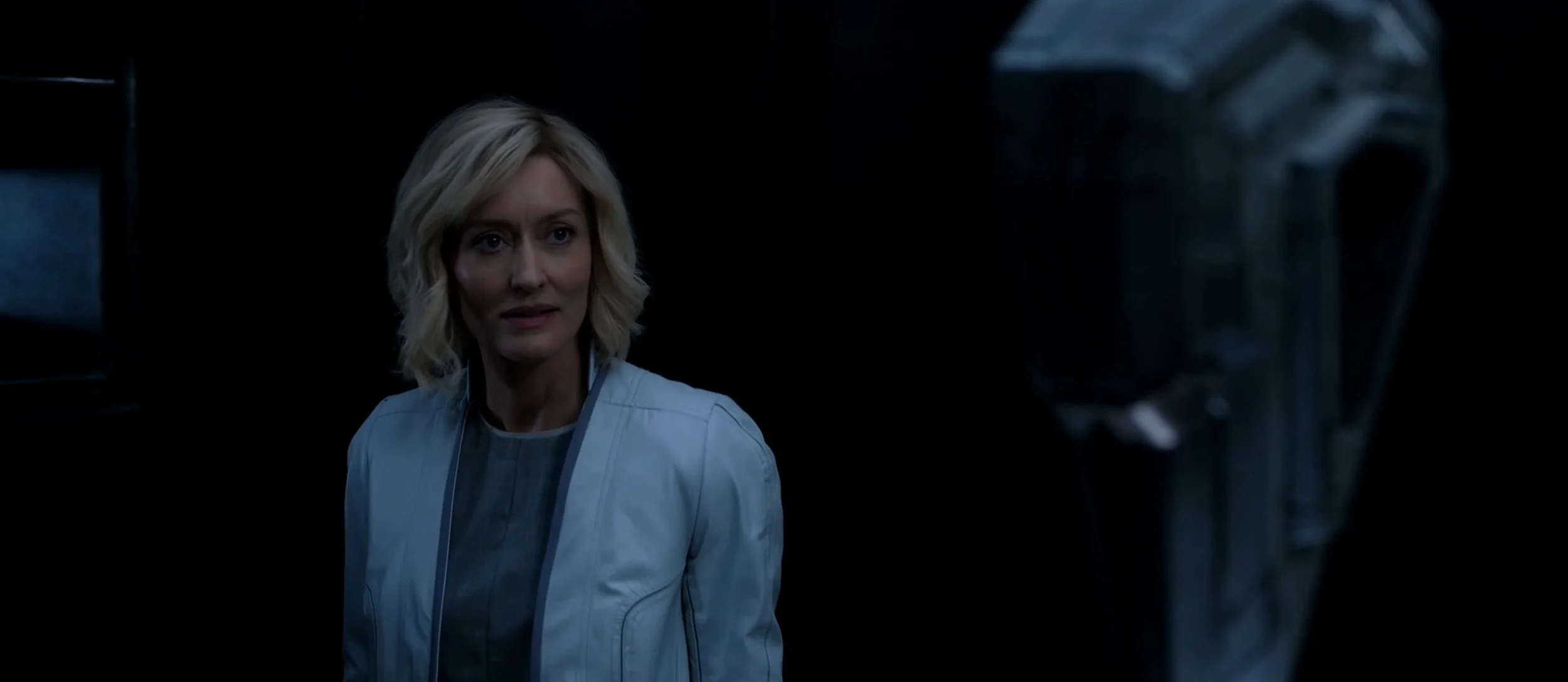“What does one do with a superhuman you’re not sure you can trust?”
For many people, including myself, accepting the Halo TV Series as true Halo has been difficult. While I have been unabashedly in favor of the show and supporting of the production news as it came out over the last few years, seeing the first episode was a jarring experience. I knew this would not be core canon, that is the storyline experienced in the games, novels, comics, and every other form of official Halo media to date. So while that didn’t throw me off, the scale of the changes was surprising and unexpected. It very much felt like the expansive Halo universe that has been built over the past twenty years was being crunched into a much shorter and much simpler timeline. Events like the opening scene feel like they should have happened in 2525 (the start of the war), not 2552 (the end of the war). The very bureaucratic and complicated structure of the UNSC, ONI, and the UEG seems to have been thematically combined into a single government entity. The lead characters running the Spartan program, xenobiology and xenotechnology studies, and local military command are all the same family (Halsey & the Keyes).
That all said, I’ve become accepting of the significantly different timeline and portrayal, and of the former, I actually am glad they went that route. I won’t deny that having a show based in core canon would be preferable to me as a lore nut, but I think this is actually better than a show that was riding the line of core canon with only a few differences. Being so significantly different I would consider this a reboot of the fictional universe, which has made it easier for me to let go of the core canon and enjoy the show and the new experiences it has to offer. I found myself questioning every scene in the first episode, wondering why they made the changes they did and trying desperately to fit this into the Halo universe I know and love. By the time I watched it a second time I had mostly left that mindset behind, and by the second episode I had complete separated core canon from the Silver Timeline in my head. I finally feel free to experience the show without the baggage of fifteen-million years of established timeline, and because of that I am really beginning to love the Halo series and the new path it is blazing.
Related Media
The following article will discuss major plot points related to episodes one and two of the Halo TV Series.
Bad News First
All that said, there are definitely issues I have with the Halo series thus far. While the show has done a good job to this point with establishing the broad strokes of the Halo universe, the finer points that make the Halo universe stand out from other military science fiction have been mostly glossed over. The major plot points of the Rubble and Soren-066 feel like fairly generic ‘struggling rebel colony home to good-guy-gone-bad pirate with a moral compass’. Similarly Fleetcom has a fairly generic feel as the home to the military command, and Halsey’s lab seemingly has lost the charm of the cluttered and messy office we’ve come to know from the novels. Madrigal is introduced in the opening scene as the standard desert planet being harvested for resources, and its return in the second episode did little to expand it beyond that generic trope. I am hopeful these establishing locations get built out throughout the season and the show, giving them more depth, but as they stand now, they are pretty generic flat locations.
This issue seems to stem in part from the show’s pacing. Say what you will about the second episode, but the first episode introduces a large portion of the main cast and locations and does so very quickly. This has led to a very fast-paced episode, but it sacrificed the building of more unique and interesting settings. Pacing is always a major concern with any television show, and while I am sure the writers were worried that a show that started off too slow would push away the general audience who were expecting action and fighting, I think they leaned too far in the other direction and sped through some of the most important aspects to building a distinctive television universe. This was somewhat remedied in the second episode, but I fear the significantly slower pace of episode two will scare off those who really enjoyed the action from episode one.
Halsey’s lab feels very… spartan.
Now the Good News
All that aside, I am really getting into the show, and am interested in where the story is headed. I mean, lets be honest, we kind of know where the story is headed, and it is a large circular artificial world that looks like one of those things that float above the heads of angels. But until then, there is actually a lot we don’t know about the Silver Timeline. Yes the Covenant are at war with humanity so we are bound to see a glassing or two, Reach is destined to fall one way or another, and humanity will soldier on, fighting the good fight. What is the ultimate fate of the characters though, we don’t know. Will Silver Team survive intact? Where do the Soren and Makee plot lines go? We really don’t know where the story is going to go episode to episode, and I love that. Between this show and Infinite, I don’t think I have been as excited to explore a new Halo story in many years, and that’s because I am interested in where the story goes. A retelling of The Fall of Reach would have been interesting to us lore nerds, but we would know where the story was headed at every moment, and the suspense would be gone.
As someone who loves character development over almost anything else in a drama, episode two was by far my favorite episode of the two released so far. It is not without its flaws, but it slows the pace way down, and takes the time to establish the world and characters better, as well as build out the story that will drive the rest of the season. Many have complained about how slow this episode is, but that is actually a huge reason why I enjoyed it so much. It feels like the difference between Halo: Combat Evolved and Halo 2 in terms of story and on a much smaller scale. While the former introduced the world in very superficial terms, the latter built out the lore, establishing the characters and their motivations.
What makes me excited is knowing where we are going to end up by the end of season one or two, but not knowing how we are going to get there. This timeline is different enough that I really can’t predict what is going to happen beat for beat or even episode to episode, and I am here for it! Will Madrigal get glassed? Probably. Will Reach fall? Most likely. Will the Pillar of Autumn narrowly escape destruction and jump to Alpha Halo, bringing Captain Keyes and Master Chief with it? I actually don’t know for sure anymore. I want to see it, but I also want to see if the Silver Timeline plays out differently. We know we have to get to a Halo eventually, but will there even be Flood on it? Will we ever get to Earth or the Ark? Is the elite we see with the Prophets the Arbiter? I don’t know and I am thrilled to be experiencing the Halo universe anew.
Is this Thel ‘Vadamee, destined to one day become the Arbiter?
Why I Love the Halo TV Series
I am writing this after just the second episode, so I may very well end up eating my words, but I have gone from thinking the Halo series was ok at best to loving the series and impatiently waiting for the next episode. I am always going to take issue with parts of the show as a person who is so familiar with the deep lore of the universe, but for what it is, I think it is pretty great. Time will tell whether the first season will become epic or if it will fizzle, but I have a lot of hope that the showrunners at least know how to make entertaining television in the Halo thematic universe.
I am also excited that this show finally has brought the Halo universe to a new audience, and this will spur new Halo projects in the future, ones that may not just feature Spartans and Halos but instead ODSTs and shield worlds and maybe even core canon. Though the show has gotten a mixed critical reception, the viewership numbers have been really good for Paramount+, and assuming that continues Paramount will definitely look to cash in on that attention, for better and for worse. Paramount is known for cashing in on a profitable idea (see: Star Trek), so lets just hope any new Halo shows are good like The Next Generation and not painfully mediocre like Discovery.
Overall this series, despite retreading on the original Halo story beats from the Halo 1-3 days, feels fresh and original. Yes, there are bits that I think are far too simplified for the sake of the new audience, but it brings a new perspective to the events of the end of the Human-Covenant War, delving far more into the characters and less into the fighting. While I gave the first episode a 6/10 originally, my rewatch has bumped that to a 7/10, and including the second episode, the show gets a 8/10 for me. I have far more hope for this show now than I did following episode one, and I can’t wait to see how the Halo story plays out from this new set of creators.









